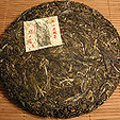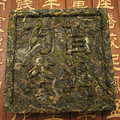Theme - Shu - Ripe Puerh
Teas - Shu - Ripe Puerh
2009 Ripe Puerh Tea Paste "Cha Gao" 25g
 0 reviews
0 reviewsAlmost on the verge of disappearing, Pu-erh tea paste used to be the special tribute to the Qing...
2014 Mengsong Ripe Puerh Cake
 0 reviews
0 reviews2014 late spring harvest, Mengsong area, moderate fermentation. Classic Menghai area...
2000 Shu Pu 7262
 1 review
1 reviewFactory - „tailor-made” private production “Zhong Cha Gong Si” in Dayi (Menghai tea factory)...
2013 Yunnan Sourcing "Year of the Snake Red
 1 review
1 reviewA premium ripe tea composed entirely from 6 and 4 years aged ripe tea from Lincang. Light to...
2005 Boyou TF 0508M Ripe Puerh Cake
 1 review
1 reviewBoyou was founded in 2005, now is one of the factories which still adhere to the strictest...
2005 Boyou TF 0507M Ripe Puerh Cake
 1 review
1 reviewBoyou was founded in 2005, now is one of the factories which still adhere to the strictest...
Quotes - Shu - Ripe Puerh
„Ripened or aged raw pu-erh has occasionally been mistakenly categorised as a subcategory of black tea due to the dark red colour of its leaves and liquor. However, pu-erh in both its ripened and aged forms has undergone secondary oxidization and fermentation caused both by organisms growing in the tea and free-radical oxidation, thus making it a unique type of tea. This divergence in production style not only makes the flavour and texture of pu-erh tea different but also results in a rather different chemical makeup to resulting brewed liquor.“

Quotes Tags: Pu-erh, Tea oxidation, Sheng - Raw Puerh, Shu - Ripe Puerh
„Pu-erh tea processing, although straightforward, is complicated by the fact that the tea itself falls into two distinct categories: the "raw" Sheng Cha and the "ripe" Shou Cha. All types of pu-erh tea are created from máochá (毛茶), a mostly unoxidized green tea processed from a "large leaf" variety of Camellia sinensis (C. sinensis assamica) found in the mountains of southern Yunnan.“

Quotes Tags: Pu-erh, Tea oxidation, Yunnan, Sheng - Raw Puerh, Shu - Ripe Puerh
„The piling, wetting, and mixing of the piled máochá ensures even fermentation. The bacterial and fungal cultures found in the fermenting piles were found to vary widely from factory to factory throughout Yunnan, consisting of multiple strains of Aspergillus spp., Penicillium spp., yeasts, and a wide range of other microflora. Control over the multiple variables in the ripening process, particularly humidity and the growth of Aspergillus spp., is key in producing ripened pu'er of high quality.“

Quotes Tags: Pu-erh, Yunnan, Shu - Ripe Puerh
Photos - Shu - Ripe Puerh
Video - Shu - Ripe Puerh
Tea by region
Remember what tea did you drink year ago?
Create your own collection of favorite teas and keep the track what you have drunk.
We will help you with tea selection.
Do you like quality loose tea?
We will help you to find the right one for you. Be inspired by tea ratings of other tea lovers. Rating stars could help you.


Latest posts
07.06.2025 @ 07:48:53 - lalo233:
The unforgiving landscapes of Arrakis in Dune: Awakening demand a mastery of combat....
07.06.2025 @ 07:48:50 - lalo233:
The unforgiving landscapes of Arrakis in Dune: Awakening demand a mastery of combat....
01.01.2016 @ 18:14:35 - Eternal Spring:
WeRateTea.com wish you all the best for 2016!...
07.12.2015 @ 09:07:02 - sypalino:
I decided to taste this tea 2 weeks after delivery. The cake is lightly pressed, so...
09.11.2015 @ 21:58:19 - Eternal Spring:
Comparison of 2013 Bada Pu-erh.sk with <a...
09.11.2015 @ 09:34:07 - Eternal Spring:
Lao Yu 2013 is now about 2,5 years old tea and out of this 1,5 year stored in Europe....
09.11.2015 @ 09:33:11 - Eternal Spring:
Comparison of all three Lao Yu is now done :)
15.10.2015 @ 11:06:37 - Eternal Spring:
2015 Chawangpu Collection – I can only tell, that all teas are very good :)
09.10.2015 @ 10:31:19 - Eternal Spring:
It was quite long and difficult tasting to make a decision… There is still quite...
24.01.2015 @ 16:55:57 - Eternal Spring:
WeRateTea.com wish you all the best for 2015!...
Review your cup of tea.
Review the tea you are drinking and help other tea lovers to find the right cup of tea.



Theme
Quotes
„Good quality old tea has a 'matured' fragrance (chen wei). This comes from tea that has been stored well and matured without any adverse effects. (xing wei - a 'fishy' smell that can be detected in old tea that has been stored poorly - should be clearly distinguished from chen wei which is quite different). “



 Shops
Shops





 Share on Facebook
Share on Facebook










